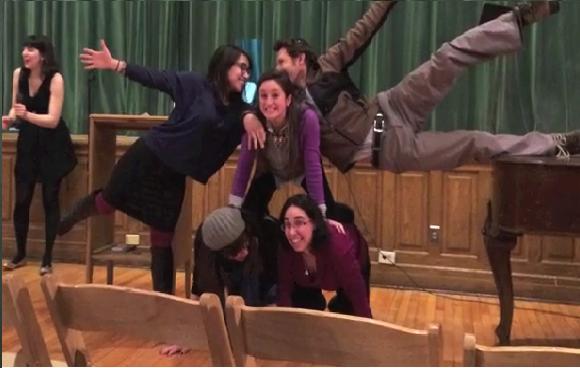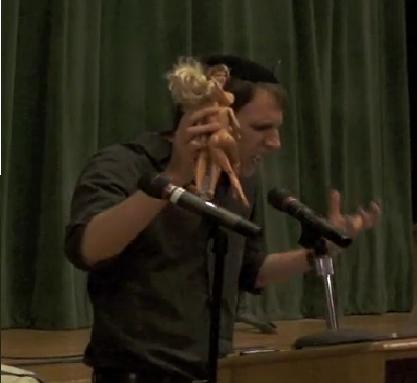“Sanctuary.” That was the theme the roughly 135 energetic young Jews of all backgrounds and beliefs huddled together in a wallpapered synagogue ballroom on a below-freezing late January night in Brooklyn to hear sermons about. Better, to hear sermons slammed about.
SermonSlam is as it sounds: Slam poetry, but for sermons. Each participant gets exactly five minutes to deliver a sermon on a pre-determined topic, this time the description of the desert Sanctuary God commands the Israelites to build in the second half of the Book of Exodus (Ch. 25-40). Sermons can and did include anything—singing, dancing, profanity, and, in one instance, Barbies having sex. After all participants have slammed, three judges deliberate and award prizes.
In between sermons the emcees and pianist kept the crowd’s energy up with audience participation games like Jewish Geography 2.0 (one person shouts out a Jewish first name, another a Jewish last name. Anyone who knows someone by that name gets a prize. Prizes were given every time) and Sanctuary Twister.
SermonSlam began life as an idea David Zvi Kalman, a doctoral student in Jewish and Islamic Law at the University of Pennsylvania, and Michal Richardson, an educational app developer, came up with around a Shabbat dinner table in October. That conversation led to SermonSlams in Philadelphia and Jerusalem, then to the one at Congregation Beth Elohim in Brooklyn, the first in New York City.
“It was a gamble,” said Samantha Kuperburg, one of the emcees. “Will people come out to see something about sermons on a Thursday night?” The gamble paid off–SermonSlam Brooklyn was the largest yet.
According to David Zvi, the key to a successful SermonSlam is for the audience to come in with an open mind. “My sense is that there is a much wider variety of Torah out there than existing platforms to express it,” he said. “If you take away all the rules for what a sermon is supposed to look like, under everything, there is a message there wanting to get out.
Kuperburg agrees. “It’s for people who are frustrated with or feel outside of mainstream Judaism, it gives a voice for all those people.
This SermonSlam was funded in part by a Make it Happen Grant from the Charles and Lynn Schusterman Foundation, a new initiative meant to fund smaller-scale Jewish experiences with potentially huge impact.
SermonSlam’s next step is to go to college. Over the next few months, events are scheduled for Ann Arbor, Mich.; Berkeley, Calif.; Cambridge, Mass.; Columbus, Ohio, Providence, R.I., and Northwestern University; in addition to Houston; Tel Aviv, and Toronto.
David Zvi and Michal have also just launched a Kickstarter campaign, and each SermonSlam will be released as a podcast, which the organizers see as an additional ways for it to inspire open, diverse Jewish communities anywhere in the world.
Though David Zvi feared that having “sermon” in the title might scare people away, he says so far, people seem to “get it.”
“It’s been exciting to see how quickly this has captured people’s imaginations,” Michal added. “People will go ahead and ‘Like’ us [on Facebook] without ever having been to one. People are curious.”
By the end of the Brooklyn Slam, after over two hours of hearing sermons, the crowd’s initial curiosity had been transformed into a giddy excitement over the radical new forms of teaching Torah they had just experienced.
“This is holy,” David Zvi said addressing the rapt crowd “This is a sanctuary built of our own contributions.”
To book a SermonSlam on your campus, visit the SermonSlam Web site.
Derek M. Kwait graduated from the University of Pittsburgh and is the editor in chief of New Voices.


